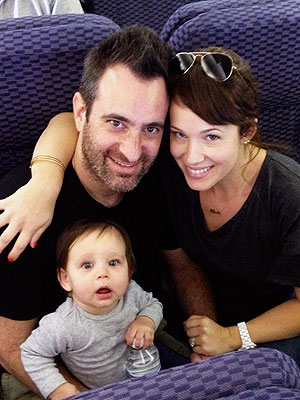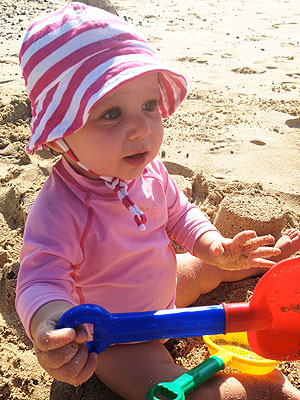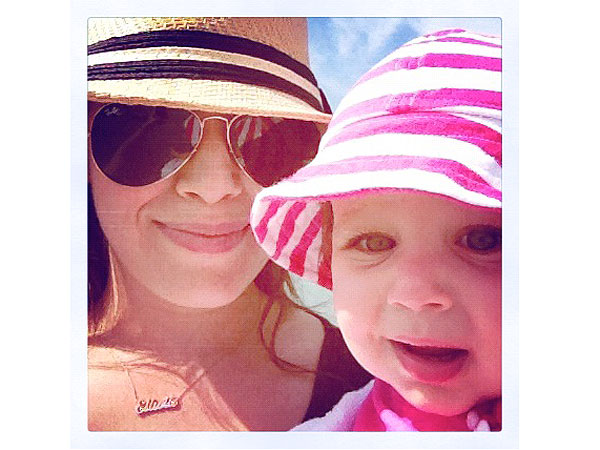
Shady ladies in Hawaii – Courtesy Marla Sokoloff
Our celebrity blogger Marla Sokoloff is a new mama!
Since audiences first got to know her at age 12 as Gia on Full House, Sokoloff has had many memorable TV roles — Jody on Party of Five, Lucy on The Practice, Claire on Desperate Housewives – as well as turns on the big screen in Whatever It Takes, Dude, Where’s My Car? and Sugar & Spice.
Sokoloff, 32, also sings and plays guitar and released an album, Grateful, in 2005.
She wed her husband, music composer Alec Puro, in November 2009 and the couple — plus pup Coco Puro — make their home in Los Angeles.
You can find Marla, now mom to 11-month-old daughter Elliotte Anne, on Twitter.
Happy 2013! I don’t know about you, but I’m completely amazed at how fast 2012 flew by! I must admit, on New Year’s Day I found myself a little weepy to say goodbye to the year that my little Elliotte came into this world. I realized that as long as I’m on this earth I will always have a soft spot for the year 2012, as it was a complete life and game-changer for me. (Clearly it’s also the year that turned me into a total sap!)
As far as resolutions go, I have a few. They include the usual suspects (exercise more, get more sleep, drink more than four sips of water per day!) but my main focus is going to be on my beloved iPhone and our very dysfunctional relationship.
I really want to work on being in the present and putting that thing down so I can suck up every delicious moment with my family. The social media and pinboards will just have to wait until after my daughter goes to bed. Baby steps!
Last week we hit a huge milestone … Elliotte took her first steps and is now walking (albeit a bit drunk-like) almost on her own! The moment was truly unbelievable and one that left me in tears (shocking … I know) as I was simply overwhelmed with joy. I was just so proud of her.
This is where my resolution isn’t a good thing because — had I not had my trusty iPhone glued to my body — I might have missed the moment. Her grandparents would have killed me! I’m just saying…

Happy New Year! – Courtesy Marla Sokoloff
We spent our Christmas vacation in paradise on the Big Island of Hawaii, but I’m here to tell you that getting there was nothing short of a nightmare. I’m not going to lie or candy-coat this blog at all because this experience was one I never want to relive.
All of my friends warned me about baby airplane travel … basically it could go either way. Kids are wild cards and you never really know what you’re going to get. So in preparation for my little wild card, I boarded our flight armed with earplugs and chocolates for the innocent passengers that could potentially be caught in the line of fire, so to speak. All the while knowing that I will never need to bring out said earplugs … I mean, my child is perfect after all!
This wasn’t Elliotte’s first flight — over the summer we traveled to San Francisco and my little angel slept for the hour flight each way, so I was certain we had this Hawaiian excursion in the bag.
I came equipped with two giant diaper bags. One was filled with diaper bag essentials (diapers, wipes, pacifiers, bottles, change of clothes for both of us) and the other ridiculously large bag was filled with toys and snacks. So many toys and snacks!! If this plane went down, Elliotte could feed the whole cabin with her copious supply of puffs and Cheerios. Basically the plan was, if this kid wasn’t sleeping, I was going to keep her busy and well-fed!
My special edition diaper bag also contained an emergency item. An SOS of sorts. An article that is generally considered a baby no-no in my house, but one that was only to be revealed if absolutely 100 percent necessary. Friends, I’m talking about the iPad. I loaded my secret weapon up with episodes of Sesame Street and adorable farm animal applications that looked like they would keep Elliotte entertained for at least a temper tantrum or two.
Very much like the aforementioned earplugs, I felt pretty confident that our no-no item wouldn’t be making an appearance.

Before takeoff… – Courtesy Marla Sokoloff
As our flight took off, I could see that Elliotte was not the happy camper I know and love. Her face turned beet-red within seconds and she was thrashing in her carseat as if it was a torture device. The tears were flowing fast and her scream was one that could not be silenced.
I looked at my husband, whose eyes said, “Bring out the iPad!!” but I knew it was way too early in our journey to pull such tricks out of sleeves.
As Alec handed out the chocolate and earplugs to our unlucky neighbors, I brought out some of Elliotte’s favorite toys. Every toy that was presented was met with a louder scream. I moved on to my trusted stash of snacks — surely a handful of puffs would soothe this outburst. Fail. I sang. I danced. I peek-a-booed. Nothing.
How can this be? The seat belt sign hasn’t even been turned off yet and I have pretty much emptied out the contents of my special-edition diaper bag!
Once the captain decided to put me out of my misery and turned the seat belt sign off, I ripped Elliotte out of her carseat (the one I brought thinking she would sleep in) and decided a nice walk down the aisle would do us both some good.
That mission was quickly aborted as the scream-fest continued to unaffected rows that were surely enjoying their cocktails and weekly gossip magazines.

My beach baby in Hawaii – Courtesy Marla Sokoloff
I handed her off to my husband and I took a much-needed break, as well as the first deep breath I had taken since leaving Los Angeles International Airport. We were now three-and-a-half hours into our six-hour flight and Elliotte showed no signs of slowing down. It was in this moment that I turned to my family and saw the chaos.
My seat was littered with toys and Cheerios and my poor child looked like a complete mess. Her face was tear-stained and her clothes were covered in squeezable applesauce. (Another failed mission.)
I knew it was time to bring out the big guns. Elmo needed to step in and he better be bringing his A-game.
I placed Elliotte on my lap and out came the iPad. Images of all of my favorite characters appeared on the screen and I instantly felt comforted by my childhood friends. Not only because they are the same characters that were my source of calm as a child, but also I knew they were the lifesavers we so desperately needed.
Well … I guess iPads and big yellow birds aren’t that comforting to teething babies that are 30,000 feet up in the air. The iPad went flying and I sunk into my seat holding my very unhappy girl tight. I was officially out of ideas.

Hawaiian fun in the sun – Courtesy Marla Sokoloff
A kind woman in front of me asked to hold Elliotte. She saw in my eyes that I was breaking down and she was a mom who got it. She understood. She didn’t judge or hate us for disrupting the beginning of her holiday vacation — she was happy to help because she had once been in our shoes with her own child. Elliotte enjoyed the break from her parents and was actually smiling in her arms.
We finally arrived in paradise and upon landing, Alec and I decided that we were moving to Hawaii as we were never going to step foot on a plane ever again.
In all fairness, in between Thanksgiving and Christmas, Elliotte went from having two teeth to eight teeth so I think the plane and cabin pressure exacerbated any existing pain she was already having. Our journey home was slightly better and she even slept for two beautiful hours!
Thank you for letting me share my story — I would absolutely love to hear some of your travel woes! I’m sure it’s even more fun for those of you who have multiple children.
Don’t forget to follow me on Twitter @marlasok or leave your comments below!
Until next time … xo,
– Marla Sokoloff
More from Marla’s PEOPLE.com blog series:









